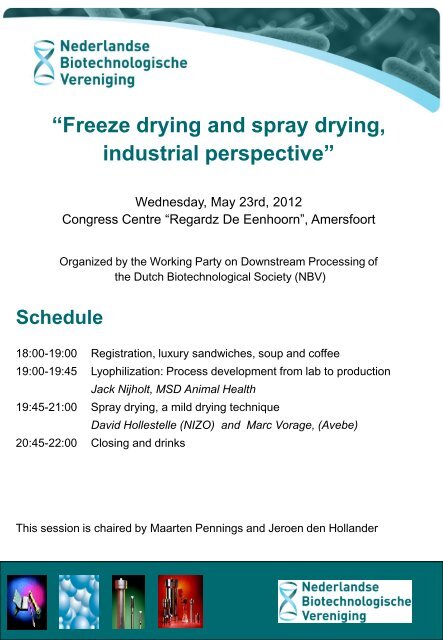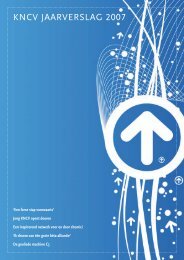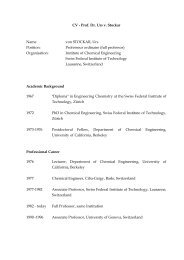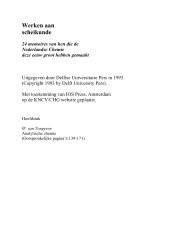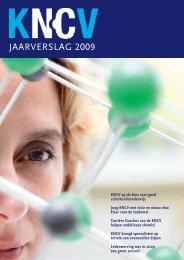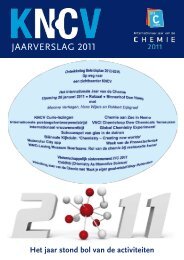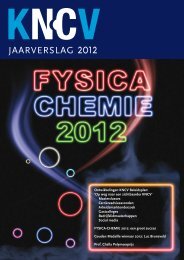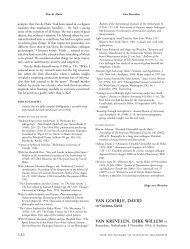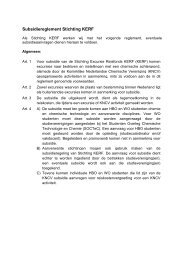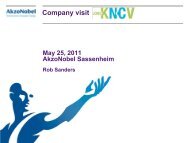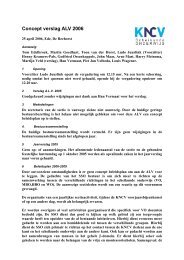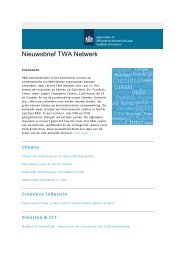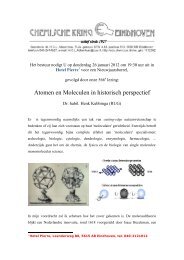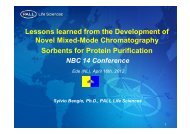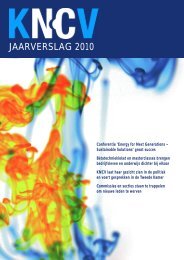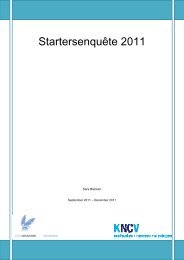Lyophilization: Process development from lab to production - Kncv
Lyophilization: Process development from lab to production - Kncv
Lyophilization: Process development from lab to production - Kncv
Create successful ePaper yourself
Turn your PDF publications into a flip-book with our unique Google optimized e-Paper software.
“Freeze drying and spray drying,<br />
industrial perspective”<br />
Schedule<br />
Wednesday, May 23rd, 2012<br />
Congress Centre “Regardz De Eenhoorn”, Amersfoort<br />
Organized by the Working Party on Downstream <strong>Process</strong>ing of<br />
the Dutch Biotechnological Society (NBV)<br />
18:00-19:00 Registration, luxury sandwiches, soup and coffee<br />
19:00-19:45 <strong>Lyophilization</strong>: <strong>Process</strong> <strong>development</strong> <strong>from</strong> <strong>lab</strong> <strong>to</strong> <strong>production</strong><br />
Jack Nijholt, MSD Animal Health<br />
19:45-21:00 Spray drying, a mild drying technique<br />
David Hollestelle (NIZO) and Marc Vorage, (Avebe)<br />
20:45-22:00 Closing and drinks<br />
This session is chaired by Maarten Pennings and Jeroen den Hollander
<strong>Lyophilization</strong>: <strong>Process</strong> <strong>development</strong> <strong>from</strong> <strong>lab</strong> <strong>to</strong><br />
<strong>production</strong><br />
Jack Nijholt, MSD Animal Health<br />
Freeze drying, or lyophilization, is a technique that is used at MSD Animal Health <strong>to</strong> stabilize live<br />
vaccines. Although the technology is time consuming and expensive it is used for a significant<br />
number of products, not only at MSD Animal Health but across the pharmaceutical industry.<br />
The presentation will include a case study of how the lyophilization cycle time of a product has been<br />
reduced, <strong>from</strong> the start of the project until implementation of the developed lyophilization cycle in<br />
the <strong>production</strong> environment. Furthermore, recent <strong>development</strong>s in freeze drying technology will be<br />
highlighted and evaluated against the pressure of producing more product in the same time frame.
Spray drying, a mild drying technique<br />
Ir. David Hollestelle (NIZO) and<br />
Ir Marc Vorage, (Avebe)<br />
Drying of heat sensitive products with hot air seems <strong>to</strong> be a paradox. However by spray drying in a co-current<br />
mode it is possible <strong>to</strong> limit the heat-exposure of the product and thus retain (most) of its functional properties. The<br />
result of heat exposure <strong>to</strong> sensitive products can be for example: denaturation of proteins, inactivation of biomass<br />
and color formation by Maillard reactions.<br />
Spray drying is an energy intensive process. As a rule of thumb only half of the energy used for heating the<br />
incoming air is used for water evaporation. The other half is lost by the (hot) vent gasses of the dryer. Polymer<br />
heat exchangers are under <strong>development</strong> <strong>to</strong> recover part of the energy <strong>from</strong> the vent-gasses <strong>to</strong> heat-up the “cold”<br />
incoming air.<br />
Despite the energy consumption, spray drying is a proven and matured technology that is capable of producing<br />
powder with the desired particle size, moist content, bulk density and many other parameters. In case of a good<br />
design and adequate air-filtration, microbial hygiene can be ensured.<br />
This presentation will explain the technology of a<strong>to</strong>mization of droplets, drying and recovery of product. The typical<br />
characteristics of spray-dried powder will be given and how these can be influenced by changing the process<br />
conditions. Some examples and future <strong>development</strong>s will be presented. Finally there is time for discussion.<br />
.
Information<br />
The mini-symposium will be held in congress center “Regardz Eenhoorn” in Amersfoort. A<br />
route description (by car and public transportation) can be found on the web site of the<br />
congress center (www.regardz.nl).<br />
The mini symposium is free of charge for members of the NBV as well as for BSc and MSc<br />
students, if registered before May 14 th , 2012. When registered before May 14 th , the fee for<br />
other attendants is €25,00. For registration after May 14 th , the fee is €30,00. Please provide at<br />
the meeting in cash and in exact money.<br />
For more information about this mini-symposium, please contact the organizers:<br />
Maarten Pennings and Jeroen den Hollander via email: nbv-pz@kncv.nl<br />
Registration<br />
Register for this mini symposium has <strong>to</strong> be done via the registration form on the website<br />
www.nbv-pz.nl.<br />
Working Party on Downstream <strong>Process</strong>ing<br />
The Working Party on Downstream <strong>Process</strong>ing is part of the Dutch Biotechnological Society<br />
(NBV). Its objectives are:<br />
• To keep the members of the working party informed on international <strong>development</strong>s in the area of<br />
recovery and purification of biological products;<br />
• To enable members <strong>to</strong> exchange ideas and discuss <strong>development</strong>s with other scientists in this<br />
area.<br />
This is done a.o. by maintaining a web-site (www.nbv-pz.nl) and organizing events such as<br />
symposia, courses and lectures.<br />
For additional information on the working party, please visit the web-site or contact any of the<br />
members:<br />
Jeroen den Hollander (jeroen.hollander-den@dsm.com) Marcel Ottens (m.ottens@tnw.tudelft.nl)<br />
Reinoud Noordman (reinoud.noordman@heineken.com) Emile van de Sandt (emile.sandt-van-de@dsm.com)<br />
\Marc Bisschops ( .bisschops@bataviabioservices.com) Michel Eppink ( michel.eppink@synthon.nl<br />
Maarten Pennings (m.pennings@bataviabioservices.com)


